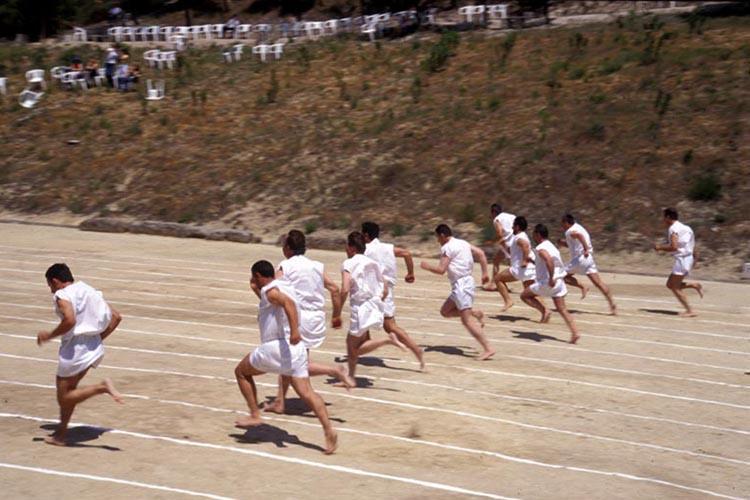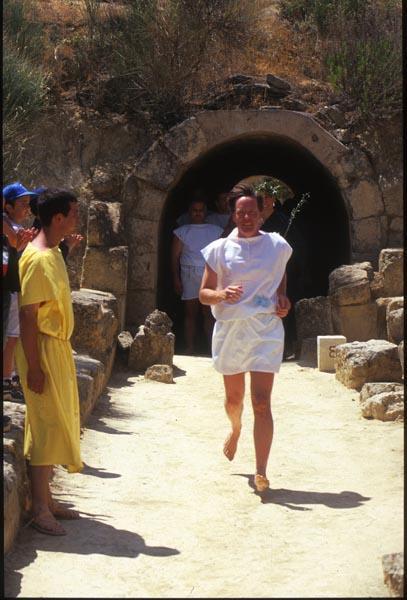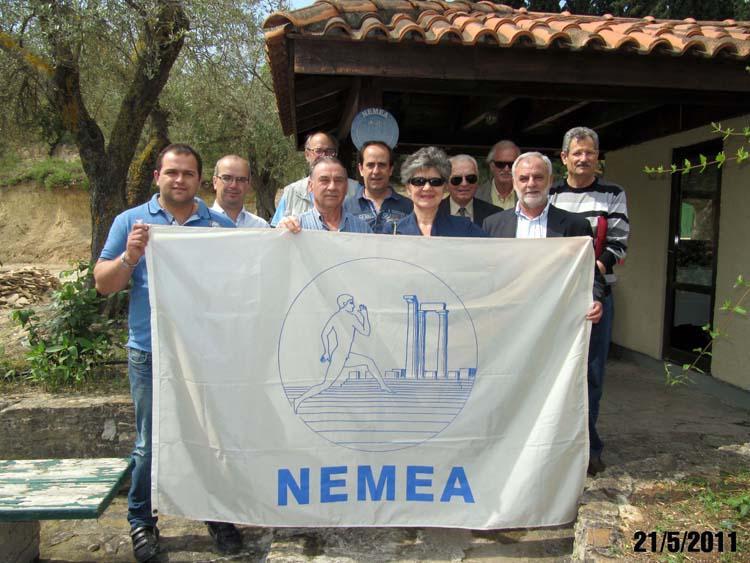On Sunday, May 15, in the Cultural Center of Nemea, a new Board of Directors was elected for the Society for the Revival of the Nemean Games. The new president of the board is Stephen G. Miller, emeritus Director of the Nemea Excavations and emeritus Professor of the University of California at Berkeley. It was Miller’s discoveries at Nemea that led to the founding of the Society in 1995 and the celebration of the first revival – the First Modern Nemead – in 1996. Now he has been called upon to prepare for and execute the Fifth Nemead. The goal is, once again, to provide an opportunity to people from around the world to become ancient Greek athletes in the ancient stadium of Nemea.
“Our founding principles were and are to recreate ancient games that are as authentic as possible, and to allow anyone and everyone to participate in them,” said Miller. “To enter the ancient locker room, disrobe and don an ancient chiton, and then go barefoot through the ancient tunnel has put chills up the spines of the 2400 people from 45 countries who have participated in the past. Nowhere else in the world can one sense what it meant to participate in the ancient Games.”

Miller and his colleagues were elected by an overwhelming majority of the 250 members of the Society in attendance who want the Fifth Nemead to bring people from all over the world to Nemea on June 23, 2012. And they want those people to return home with a new appreciation of what Greece still means to the world today. They have their work cut out for them – it is estimated that it will cost about 260,000 euros to execute the Fifth Nemead, with the largest part of that amount going toward the conservation of the tunnel which is necessary to insure the safety of people passing through it.
The tunnel is structurally sound according to Miller who discovered and published it, but fragments of blocks can break off and fall on people. A temporary scaffolding to protect visitors has to be removed and the vault – one of the earliest known from antiquity – consolidated. “We have the study done by Kostas Zampas, the best conservation engineer in Greece if not the world,” said Miller. “That study has been approved by the Ministry of Culture, and we intend to implement it working with Konstantinos Kissas, the Ephor of Antiquities in Corinth. Next year hundreds, if not thousands, of visitors will be transformed into ancient Greek athletes as they walk through the 36 meter long tunnel past the ancient graffiti on its walls,” Miller stated.

he new Board of Directors has several members who, like Miller, have served in the revival of the Nemean Games in the past. The Vice President is George Kostouros who not only has been working for the Society for many years, but who has also authored a book Νεμέων άθλων διήγησις which brings together –in poetic form – the evidence for the myths and history of ancient Nemea, and a newly revised list of victors in the ancient games.
Ioannes Flessas, a retired banker, is the Treasurer as he was for the First Nemead in 1996. Nikos Fenerlis returns after two years as the General-Secretary who will be responsible for the transformation of the Society’s archives to electronic form. The other five members of the board – Maria Christara, Ioannes Nakes, Georgios Nikitakos, Konstantinos Niteros, and Nikos Papadopoulos – all have extensive experience with previous Nemeads.
Each of the nine members of the board is chairing a committee to organize volunteers for a variety of tasks (e.g. fundraising, membership, stadium maintenance, program organization), based on decisions in common with the other board members.

“But,” Miller emphasized, “the success of the Fifth Nemead will depend upon the support of hundreds of volunteers, and especially a co-operative effort with the present director of Berkeley’s continuing work at Nemea, Professor Kim Shelton, and the American School of Classical Studies at Athens.
I shall never forget the excitement of the stadium coming back to life in 1996. With our combined efforts we shall experience the excitement of that revival once again next year.”